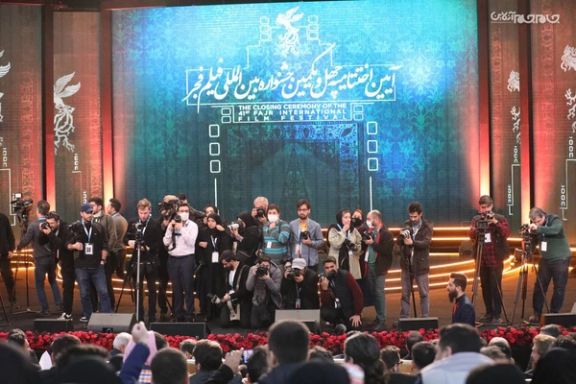Iran's Once Burgeoning Film Festival Plunges Into Darkness

The Fajr Film Festival, Iran's biggest and most extravagant annual cultural event, has become mired by the politics of fundamentalism and Islamic populism.

The Fajr Film Festival, Iran's biggest and most extravagant annual cultural event, has become mired by the politics of fundamentalism and Islamic populism.
Before conservative President Ebrahim Raisi took office in 2021, major film festivals in Europe and the United States, including those in Berlin, Cannes, and Chicago looked forward to the event to select some of the finest Iranian movies for their own events.
Until three years ago, no international film festival was perfect without an Iranian movie directed by an internationally renowned Iranian filmmaker. Things have now changed.
Iran's populist Culture Minister Mohammad Mehdi Esmaili even cautioned reporters not to use the words Festival Palace, and to use the revolutionary expression Festival House instead, as "Palace" was a place for taghooties (those who do not worship God). The word came back to the press from the darkest dungeons of the overtly fundamentalist and seemingly militant 1979 Islamic revolution.
The same Culture Minister tried earlier this week to lure a popular Iranian singer in Los Angels to return to Iran after four decades. This was of course a move to pacify a sulking nation to encourage them to take part in the upcoming elections. Minutes after the statement by the Culture Minister an Iranian lawyer warned the singer that he would be facing a 28-year jail sentence if he ever set foot in Iran again.

Iranian social media users, including a former presidential chief of staff, who can crack dark jokes about any serious matter, reminded the singer, Nasrollah Moin, that the Minister was right. He can always arrive at the Tehran international airport, but there is no guarantee he would be able to depart.
Film critics widely agree that the quality of Iranian cinema has declined in recent years. It's important to note that the deterioration in the film industry didn't solely occur during President Raisi's administration. The decline began during former President Hassan Rouhani's second term when Iranian filmmakers faced pressure from the IRGC and intelligence organizations. Even internationally acclaimed director Jafar Panahi received a lengthy prison sentence. The situation worsened after the 2022 protests.
At present, most Iranian films are produced by intelligence organizations and the IRGC, with a directive to promote official ideology. As a result, numerous uninspiring movies are being made, often featuring the same group of actors and filmmakers. Many other talents in the industry are no longer favored by the government, as some prominent figures, such as Mahnaz Afshar and Hamid Farrokh Nejad, have left Iran to join opposition groups
Some 106 Iranian movies are to be screened for the first time in this year's festival from February 1 to 11, during the Ten Days of Dawn, or the anniversary of the 1979 revolution. These movies are mainly directed by individuals hitherto unknown to Iranian film industry and movie-goers. They are well-connected individuals who can get hold of hefty government budgets to make these films.
However, a few like comedian Mehran Modiri and Soroush Sehhat and renowned cinematographer Mahmoud Kalari have also presented their films to the festival. The first two artists were reportedly barred from entering the Festival House to meet the formalities for screening their films and were branded as taghooties.
Meanwhile, asked why all the members of the festival's selection committee are men and there are no women among them, the festival's secretary, Mojtaba Amini, said selecting films is a tough job and women cannot do that, but he will make sure that a woman filmmaker is on the board of the jury. Interestingly, Amini was the producer of IRGC-funded TV series Gando that levelled many unfounded accusations against former Foreign Minister Javad Zarif.
All of the members of the Selection Committee of the festival have been carefully chosen from among hardliners in Iran's film industry.